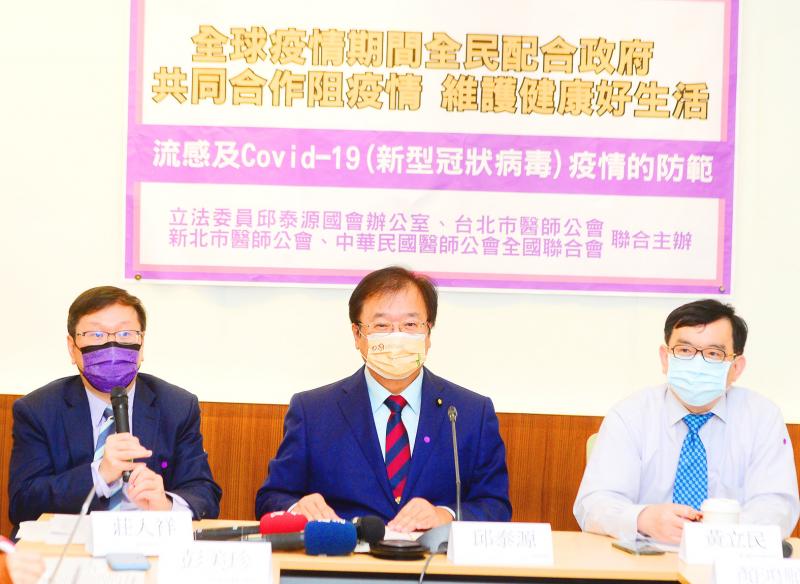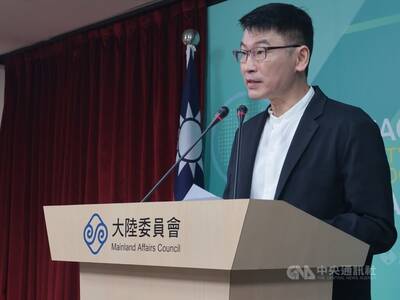The Central Epidemic Command Center (CECC) yesterday reported two imported cases of COVID-19 as it announced detailed rules for the three quarantine options for travelers arriving in Taiwan from Dec. 14 to Feb. 14.
Centers for Disease Control (CDC) Deputy Director-General Chuang Jen-hsiang (莊人祥), the CECC’s spokesman, said no local COVID-19 infections or deaths were reported yesterday.
The two imported cases are two men, aged 20 to 40, who arrived from Cambodia and Ireland, he said, adding that one tested positive upon arrival and the other upon ending quarantine.

Photo: Wang Yi-sung, Taipei Times
CDC Deputy Director-General Philip Lo (羅一鈞), deputy chief of the CECC’s medical response division, said both men were fully vaccinated with the Pfizer-BioNTech vaccine and the Sinopharm vaccine.
Chang addressed confusion about the three quarantine options for travelers arriving in Taiwan between Dec. 14 and Feb. 14, explaining the rules for each in detail.
The three options all include mandatory 14-day quarantine, followed by seven days of self-health management, and all travelers must undergo a polymerase chain reaction (PCR) test at the airport.
Chuang said people who choose the current quarantine “14+0 (+7)” option — quarantine at a hotel or self-paid centralized quarantine facility for 14 days — are subject to a second PCR test upon ending quarantine, and they are required to take a government-funded at-home rapid test upon ending self-health management.
People who select the “10+4 (+7)” option — quarantining at a hotel or centralized quarantine facility for the first 10 days, followed by four days at home if they test negative before leaving the hotel or facility — would be required to take two more PCR tests, one on the 10th day of quarantine and one before ending quarantine, he said.
People who opt for the “7+7 (+7)” option for fully vaccinated individuals — quarantining at a hotel or centralized quarantine facility for the first seven days (168 hours), followed by seven days at home if they test negative before leaving the hotel or facility — are required to take a self-paid at-home test on the 10th day of quarantine and a PCR test upon ending quarantine, Chuang said.
For the “10+4 (+7)” and the “7+7 (+7)” options, quarantined individuals would not be required to take another at-home rapid test during their self-health management period, CECC information showed.
It is suggested that people who choose those two options quarantine alone at home, or if they choose to follow the “one person per room” rule, those living in the same house must also be fully vaccinated, Chuang said.
A big difference between the two options is that under the “7+7 (+7)” rule people living in the same household as the quarantined individual would be subject to “enhanced self-health management” for the seven days that the individual is quarantined at home, and they would also need to practice seven days of self-health management along with that individual, he said.
People living with a quarantined individual would be required to take two self-paid rapid at-home tests on the 10th day after that individual arrived in Taiwan, as well as when they are about to end quarantine, he added.
Coresidents who are practicing “enhanced self-health management” cannot share a room, bathroom or have a meal with the quarantined individual, and are banned from taking public transport or visiting crowded locations such as restaurants and scenic spots, he said.
They are also required to delay non-urgent visits to healthcare facilities, register their contact details and keep a record of their daily activities, he said.

ENDORSING TAIWAN: Honduran presidential candidate Nasry Afura said that Honduras was ‘100 times better off’ when it was allied with Taipei The Ministry of Foreign Affairs yesterday said it would explore the possibility of restoring diplomatic relations with Honduras based on the principle of maintaining national interests and dignity. The ministry made the remarks in response to reporters’ questions regarding an article titled: “Will Taiwan Regain a Diplomatic Ally?” published in The Diplomat on Saturday. The article said Honduras’ presidential election in November could offer Taiwan the chance to regain an ally, as multiple candidates have promoted re-establishing diplomatic relations with Taiwan. Honduras severed diplomatic ties with Taiwan in March 2023 in favor of Beijing, but since switching its diplomatic recognition,

A fourth public debate was held today about restarting the recently decommissioned Ma-anshan Nuclear Power Plant, ahead of a referendum on the controversial issue to be held in less than two weeks. A referendum on Aug. 23 is to ask voters if they agree that “the Ma-anshan Nuclear Power Plant should continue operations upon approval by the competent authority and confirmation that there are no safety concerns.” Anyone over 18 years of age can vote in the referendum. The vote comes just three months after its final reactor shut down, officially making Taiwan nuclear-free. Taiwan People’s Party Chairman Huang Kuo-chang (黃國昌) represented

Scoot announced yesterday that starting in October, it would increase flights between Taipei and Japan’s Narita airport and Hokkaido, and between Singapore and Taipei. The low-cost airline, a subsidiary of Singapore Airlines, also said it would launch flights to Chiang Rai in Thailand, Okinawa and Tokyo’s Haneda airport between December and March next year. Flights between Singapore and Chiang Rai would begin on Jan. 1, with five flights per week operated by an Embraer E190-E2 aircraft, Scoot said. Flights between Singapore and Okinawa would begin on Dec. 15, with three flights per week operated by Airbus A320 aircraft, the airline said. Services between Singapore

The Mainland Affairs Council (MAC) yesterday announced a ban on all current and former government officials from traveling to China to attend a military parade on Sept. 3, which Beijing is to hold to mark the 80th anniversary of the end of the Second Sino-Japanese War. "This year marks the 80th anniversary of the end of World War II and the Republic of China’s victory in the War of Resistance [Against Japan]," MAC Deputy Minister and spokesperson Liang Wen-chieh (梁文傑) told a regular news briefing in Taipei. To prevent Beijing from using the Sept. 3 military parade and related events for "united